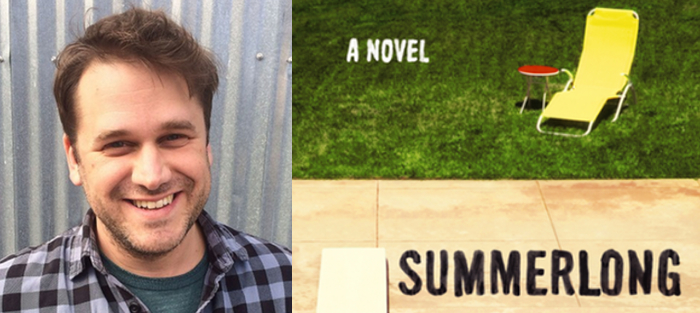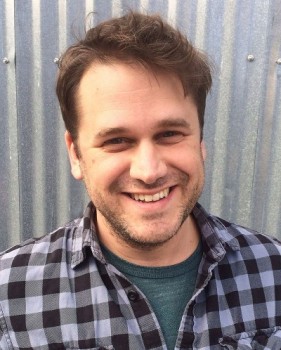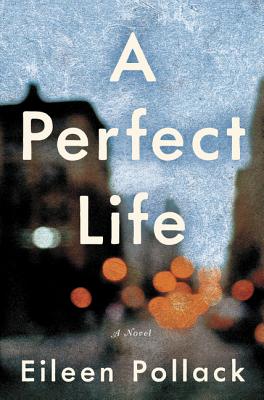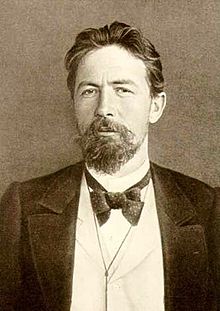Dean Bakopoulos’ Please Don’t Come Back from the Moon was a New York Times Notable Book; he co-wrote the screenplay adaptation of the novel, soon-to-be-released as a film starring James Franco and Rashida Jones. His second novel, My American Unhappiness, was named one of the year’s best novels by The Chicago Tribune, and his latest novel, Summerlong, just released in paperback, was an independent bookstore bestseller. His fiction, essays, and criticism have appeared in Zoetrope, Tin House, Virginia Quarterly Review, Real Simple, The San Francisco Chronicle, The Progressive, The Los Angeles Times, and The New York Times. The winner of a Guggenheim Fellowship, Bakopoulos teaches in the Warren Wilson MFA Program and is writer-in-residence at Grinnell College in Iowa, where he lives with his wife, novelist Alissa Nutting, and their children. He is at work on a fourth novel, In the Pines, and a collection of essays, Undoing, a portion of which earned Bakopoulos a 2016 National Endowment for the Arts fellowship; he previously won an NEA grant in 2006 for fiction.
Interview:
Charles Baxter: The novel is set during a period of heat and sleeplessness. Did you think of the seasonal conditions as a realistic background to your story, or as metaphoric and emblematic, pointing us toward the restlessness of early middle age (for example)?
Dean Bakopoulos: Well, here in the Midwest, as you know, the various extremes of the weather–deep winter and high summer–can sometimes feel oppressive, particularly if you’re already in a low mood. I’m interested in the way climate change is increasing our already anxious, unsettled culture. But more specifically, I think extreme weather amplifies the pressures at hand in this novel, and occasionally alleviates them by giving people a kind of permission to get into trouble, and I think that’s rather realistic. If you’re already feeling claustrophobic, restless, aroused, or filling up with self-pity, a heat wave or a hard freeze is going to feel like one more thing that’s gone out of control for you. Break up novels (or break up albums in music) are about the loss of control. Bon Iver’s beautiful “For Emma, Forever Ago,” for instance, seems like it could only have been produced during a great Wisconsin winter; Dylan’s song “If You See Her, Say Hello,” from “Blood on the Tracks,” which destroys me every time I hear it, feels very much like a summer song, from the moment the city of Tangier is evoked.
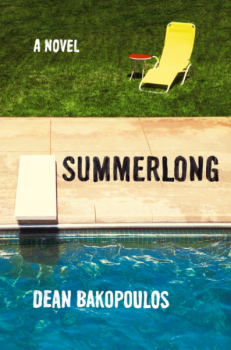 Weather is beyond our control. And I think early middle age is a time when you become increasingly aware of how little control you have in your life–you’re powerless before economic or cultural forces, your kids are growing up in a way that was not the ideal way you had planned, your marriage finds itself in a place you thought reserved for other peoples’ marriages, some friends have died. Some people, like ABC in the novel, who loses her lover swiftly and without warning, discover that feeling of powerlessness at a young age. I mean, we all know we have no control in this world, intellectually. But the first moment you realize that on a deep and specific and personal level, I think a second maturity happens, and it can be either liberating or devastating. Probably a bit of both. Jane Smiley wrote about this feeling so beautifully in her novella “The Age of Grief,” which was a big influence on this book.
Weather is beyond our control. And I think early middle age is a time when you become increasingly aware of how little control you have in your life–you’re powerless before economic or cultural forces, your kids are growing up in a way that was not the ideal way you had planned, your marriage finds itself in a place you thought reserved for other peoples’ marriages, some friends have died. Some people, like ABC in the novel, who loses her lover swiftly and without warning, discover that feeling of powerlessness at a young age. I mean, we all know we have no control in this world, intellectually. But the first moment you realize that on a deep and specific and personal level, I think a second maturity happens, and it can be either liberating or devastating. Probably a bit of both. Jane Smiley wrote about this feeling so beautifully in her novella “The Age of Grief,” which was a big influence on this book.
I know you have an escalator theory of plot and structure. What is the escalator theory?
Briefly put, it’s a theory that most compelling narratives move through a series of small but irreversible changes in the characters’ lives. Each small step changes the way they see the world; it’s a lift or decline in perspective.
I have this idea that most compelling narratives begin when a character rather suddenly finds himself or herself in motion. When you get on one of those massive escalators at the airport, for example, you pretty quickly realize that you can’t turn around, even if the Cinnabon is what you were after and it’s on the level below yours. You’re committed. You’re going up. You’re not gonna get that Cinnabon, at least not right away. That’s act one.
And about midway through that escalator ride, you realize there are people behind you. Going back would mean dealing with all of those people, who’d be rather inhospitable to a man bumping his way down the up escalator. I like to imagine at some point in a novel, a protagonist not only realizes he/she can’t go back, but also that there is something (a person, a memory, a trauma, a loss, a monster) menacingly behind them. That’s about the midpoint of act two, I guess.
Now they really can’t go back, and now they see the next level is approaching. They have to go there; they have to prepare for that. They have to look at the world that’s up there. That cup can’t pass from them, to paraphrase Jesus. At the top of the escalator (or at the bottom, this can work in the reverse as well) they understand they’ll never see the world in quite the same way again. I think a lot of short stories and novels end there, at that kind of place of epiphany. But my favorite narratives, in fact like some of the narratives in your new book of stories, There’s Something I Want You To Do, which I loved, don’t stop there. Instead, at that new height, they make their characters face those things/people that were behind them. Those things get off the escalator too, and join them at that new place of perspective. And act three begins. Robert Stone’s beautiful short story “Helping” does this, I think. So does “Marie” by Edward P. Jones. So do many of the stories in Lorrie Moore’s last collection, “Bark,” in which those wonderful and strange stories rebel against the idea of closure with a rather heartbreaking kind of rage.
Do you think this theory can be applied to Summerlong?
As a teacher, I feel like so many of the stories I read from my students end at that place of changed perspective, rather than dramatizing the conflict that comes when one changes his/her perspective. So many writers skip act three in their first drafts, almost like we feel our characters have endured enough by simply acknowledging the monsters/demons/losses behind them. But in life, we usually end up having to fight those demons, not just nod our head at them politely and move on. They come right up to us in the airport, breathe in our face, grab our lapels.
In Summerlong, the novel opens with restless characters almost deliberately putting themselves in motion. A few steps up the escalator, Claire Lowry turns to her husband Don and asks, “Why are we still married?” It’s a question that, once asked, cannot be taken back. This is the moment when all the characters in the book realize they are going up. Or going down, in some cases.
I was very cognizant of the idea of writing short, escalating chapters–it’s something I picked up while learning how to write television pilots. TV writers know intuitively how to trust their scenes–they don’t rely on backstory or exposition or long flights of interiority. They use dialogue, gesture, and imagery. They stage the scenes. They pay attention to faces. A lot of your essays in Burning Down the House and The Art of Subtext also point this out: faces are important, stages are important, the movement of a narrative is important. From a craft perspective, those two books of essays taught me a lot about how to build the scenes in this novel. And, in all honesty, obsessively watching the way Season One of the show “Mad Men” unfolded taught me a great deal about pacing and structure, how to dole out information, how to not obsess over backstory.
These are great answers. And you should know that I loved Summerlong, though as I read it, I felt as if I were watching a large community painting that was being unrolled, and the colors were getting darker and darker, the more I saw. Did you think the characters were orchestrating their own fates–I’m thinking of Don Lowry here, especially–or were in the grip of something that was larger and more powerful than they were? The question of whether anybody is blameworthy arises here, depending on your answer.
Well, thanks for the kind words about the novel, and, wow, I love that metaphor of the unfurling community painting. I do think the stormier aspects of the novels become apparent in small steps–escalating steps!–and in some ways, I suppose that mirrors what happened in my own personal life while I was composing the novel. What began as a series of questions I wanted to explore about marriage, midlife, and melancholy, became increasingly linked to what was happening in my own life. And because this sort of synchronicity happened to some extent with all three of my novels, I feel like maybe writers, in general, orchestrate their fates. Once you peer at your fears, they sort of come alive. You write about things you’ve been ignoring, and then you can’t ignore them anymore. There’s a lot of me in Don Lowry, and a lot of me in Claire Lowry too. I gave them each some of my demons.
I do think the characters in this novel are blindsided by forces they didn’t expect to emerge in their lives, but there is something about these characters, maybe Don Lowry in particular, that make them cultivate the upheaval as soon as it appears. I think we often—or at least I often—fear the loss of control so much that I try and get out in front of chaos. Often, I make more chaos in the process. You can get angry fast and hurt a lot of people in this way, even if the initial impulse–say the preservation of a long marriage–was a noble one. And Maybe Don and Claire do that–the moment a crack appears in their marriage, they both begin to act in ways that turn a fracture into break. I don’t think people do this because they want their lives to fall apart; it’s rather that, IF their lives are going to fall apart (and I suppose everybody’s does at some point in their life, in some way or another), it’s going to happen on their own terms, dammit.
Without giving the story away, I felt that something like grace descends on the characters near the end of the book. It’s not a religious moment, but it might be construed as one. I feel that you are like many others these days, a religious-person-without-a-religion. Do you feel that your book has elements of the spiritual life? Take this question anywhere you want to.
I definitely believe that a spiritual dimension exists, and I suppose I believe it exists at the point where suffering is met by love. I think the final third of the novel is replete with suffering and the imperfect kinds of love characters seek and offer to alleviate it. Also, in all of my books, I try to honor and relish in the idea that almost every story is peppered by wholly inexplicable mysteries as well as facts and events.
In my own spiritual life, I am big on compassion and love, but quite terrible with anger and forgiveness. I hold grudges, and rehash regret with a kind of obsessiveness that is perhaps my biggest weakness. I feel like many of my books are attempts to get rid of old wounds, and find, by the end of the novel, some beauty and grace, both in the story and in my own heart as well.

